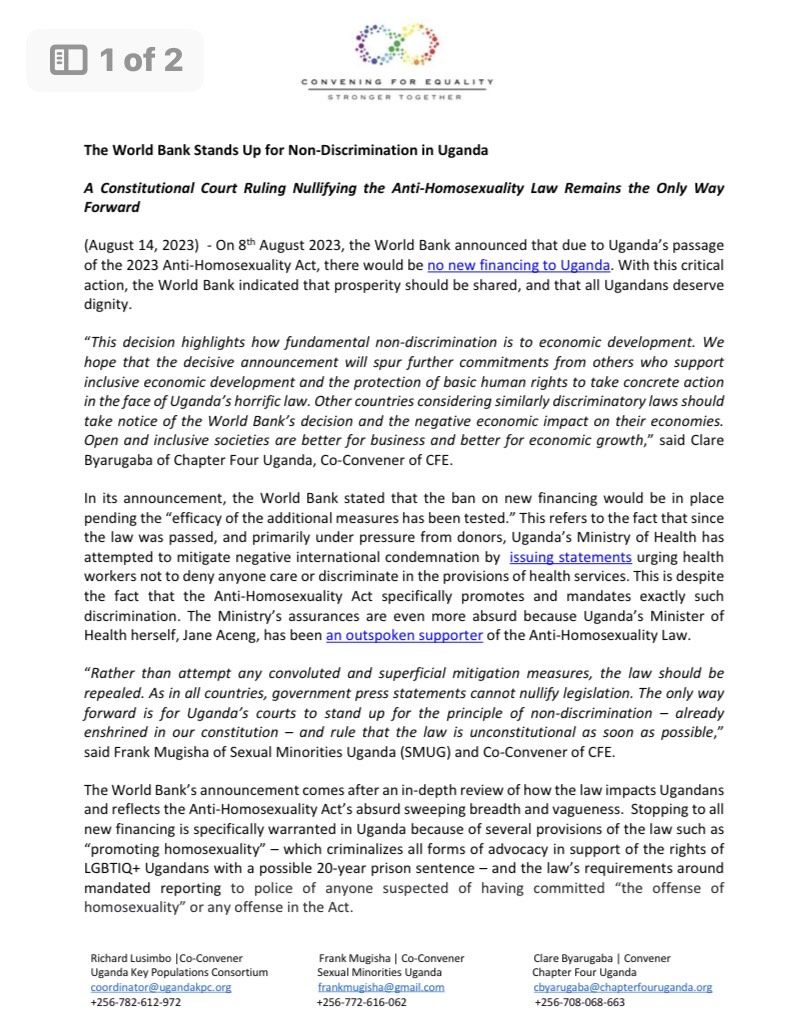The World Bank Stands Up for Non-Discrimination in Uganda
A Constitutional Court Ruling Nullifying the Anti-Homosexuality Law Remains the Only Way Forward
(August 14, 2023) – On 8th August 2023, the World Bank announced that due to Uganda’s passage of the 2023 Anti-Homosexuality Act, there would be no new financing to Uganda. With this critical action, the World Bank indicated that prosperity should be shared, and that all Ugandans deserve dignity.
“This decision highlights how fundamental non-discrimination is to economic development. We hope that the decisive announcement will spur further commitments from others who support inclusive economic development and the protection of basic human rights to take concrete action in the face of Uganda’s horrific law. Other countries considering similarly discriminatory laws should take notice of the World Bank’s decision and the negative economic impact on their economies. Open and inclusive societies are better for business and better for economic growth,” said Clare Byarugaba of Chapter Four Uganda, Co-Convener of CFE.
In its announcement, the World Bank stated that the ban on new financing would be in place pending the “efficacy of the additional measures has been tested.” This refers to the fact that since the law was passed, and primarily under pressure from donors, Uganda’s Ministry of Health has attempted to mitigate negative international condemnation by issuing statements urging health workers not to deny anyone care or discriminate in the provisions of health services. This is despite the fact that the Anti-Homosexuality Act specifically promotes and mandates exactly such discrimination. The Ministry’s assurances are even more absurd because Uganda’s Minister of Health herself, Jane Aceng, has been an outspoken supporter of the Anti-Homosexuality Law.
“Rather than attempt any convoluted and superficial mitigation measures, the law should be repealed. As in all countries, government press statements cannot nullify legislation. The only way forward is for Uganda’s courts to stand up for the principle of non-discrimination – already enshrined in our constitution – and rule that the law is unconstitutional as soon as possible,” said Frank Mugisha of Sexual Minorities Uganda (SMUG) and Co-Convener of CFE.
The World Bank’s announcement comes after an in-depth review of how the law impacts Ugandans and reflects the Anti-Homosexuality Act’s absurd sweeping breadth and vagueness. Stopping to all new financing is specifically warranted in Uganda because of several provisions of the law such as “promoting homosexuality” – which criminalizes all forms of advocacy in support of the rights of LGBTIQ+ Ugandans with a possible 20-year prison sentence – and the law’s requirements around mandated reporting to police of anyone suspected of having committed “the offense of homosexuality” or any offense in the Act.
These broad provisions go well beyond the criminalization of same sex conduct, already in Uganda’s laws since the colonial era, and mean that public health workers and others – Ugandans or visitors to the country – face long prison sentences and hefty fines for implementing programs or voicing allyship.
Since the law was assented to by the President on May 29, there have been numerous reports of people being denied healthcare on the basis of their real or perceived sexual orientation or gender identity. LGBTIQ+ Ugandans have experienced violence and bullying in schools, been evicted from housing and fired from jobs. Scores of Ugandans have reportedly sought refuge in other countries to escape the state sponsored discrimination and hate. The Anti-Homosexuality Act is a continuing source of human rights abuses and limitations on the ability of many Ugandans to access public health services and improve their lives in meaningful ways.
Unless development efforts include everyone, Uganda will not achieve its full potential. Importantly, the principle of inclusion is not only for LGBTIQ+ people, but for all Ugandans who may be deprived of livelihoods, housing, and education because of inequalities and state-sponsored discrimination.
The August 8th public announcement comes on the heels of an urgent call from over 170 Civil society organisations around the world that urged the World Bank to publicly state what range of possible actions it may take in the face of such a deeply discriminatory law that plainly violates the World Bank’s own safeguard policies.




